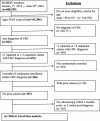The impact of travel time on colorectal cancer stage at diagnosis in a privately insured population
- PMID: 30885199
- PMCID: PMC6423832
- DOI: 10.1186/s12913-019-4004-6
The impact of travel time on colorectal cancer stage at diagnosis in a privately insured population
Abstract
Background: Rural residents are less likely to receive screening for colorectal cancer (CRC) than urban residents. However, the mechanisms underlying this disparity, especially among people aged 50-64 years old with private health insurance, are not well understood. We examined the impact of travel time on stage at CRC diagnosis.
Methods: This retrospective cohort study used data from the Blue Cross and Blue Shield of Nebraska. Members of this private insurance company aged 50-64 years, diagnosed with CRC during the period 2012-2016, and continuously enrolled in the insurance plan for at least 6 months prior to CRC diagnosis, were selected for this study. Using Google Maps, we estimated patients' travel time from their home ZIP code to the ZIP code of their colonoscopy provider. Using logistic regression, we analyzed the association between stage at CRC diagnosis, travel time, use of preventive services (i.e., check-ups or counseling to prevent or detect illness at an early stage) and patient characteristics.
Results: A total of 307 subjects met the inclusion criteria. People who had not used preventive services 6 months prior to CRC diagnosis had 2.80 (95% CI, 1.00-7.90) times the odds of metastatic CRC compared to those who had used these services. No statistically significant association was found between travel time and metastatic CRC diagnosis (P = 0.99; 95% CI, 0.98-1.01).
Conclusions: The fact that 13% of the study population presented with metastatic CRC suggests some noncompliance with preventive services such as screening guidelines. To increase screening uptake and reduce metastatic cases, employers should offer incentives for their employees to make use of preventive services such as CRC screening.
Keywords: Access to care; Colorectal cancer; Geography; Health services research; Private insurance.
Conflict of interest statement
Ethics approval and consent to participate
The University of Nebraska Medical Center Institutional Review Board (IRB# 366–1) approved this study.
Consent for publication
Not applicable.
Competing interests
The authors declare that they have no competing interests.
Publisher’s Note
Springer Nature remains neutral with regard to jurisdictional claims in published maps and institutional affiliations.
Figures
Similar articles
-
Spatial accessibility to colonoscopy and its role in predicting late-stage colorectal cancer.Health Serv Res. 2021 Feb;56(1):73-83. doi: 10.1111/1475-6773.13562. Epub 2020 Sep 20. Health Serv Res. 2021. PMID: 32954527 Free PMC article.
-
Is Travel Time to Colonoscopy Associated With Late-Stage Colorectal Cancer Among Medicare Beneficiaries in Iowa?J Rural Health. 2016 Sep;32(4):363-373. doi: 10.1111/jrh.12159. Epub 2015 Nov 26. J Rural Health. 2016. PMID: 26610280 Free PMC article.
-
Factors Contributing to Delay in Specialist Care After Colorectal Cancer Diagnosis in Kentucky.J Surg Res. 2021 Mar;259:420-430. doi: 10.1016/j.jss.2020.09.012. Epub 2020 Oct 20. J Surg Res. 2021. PMID: 33092860 Free PMC article.
-
Rural-Urban Disparities in Colorectal Cancer Screening, Diagnosis, Treatment, and Survivorship Care: A Systematic Review and Meta-Analysis.Oncologist. 2024 Apr 4;29(4):e431-e446. doi: 10.1093/oncolo/oyad347. Oncologist. 2024. PMID: 38243853 Free PMC article.
-
Recent insights into nanotechnology development for detection and treatment of colorectal cancer.Int J Nanomedicine. 2016 Jun 2;11:2491-504. doi: 10.2147/IJN.S108715. eCollection 2016. Int J Nanomedicine. 2016. PMID: 27330292 Free PMC article. Review.
Cited by
-
Spatial accessibility to colonoscopy and its role in predicting late-stage colorectal cancer.Health Serv Res. 2021 Feb;56(1):73-83. doi: 10.1111/1475-6773.13562. Epub 2020 Sep 20. Health Serv Res. 2021. PMID: 32954527 Free PMC article.
-
Spatial Insights for Understanding Colorectal Cancer Screening in Disproportionately Affected Populations, Central Texas, 2019.Prev Chronic Dis. 2021 Mar 4;18:E20. doi: 10.5888/pcd18.200362. Prev Chronic Dis. 2021. PMID: 33661726 Free PMC article.
-
The Outcome of Unscreened Population in Colorectal Cancer: The Impact of Sex and Other Determinants on Cancer Stage.Cancer Manag Res. 2020 Dec 1;12:12319-12327. doi: 10.2147/CMAR.S268823. eCollection 2020. Cancer Manag Res. 2020. PMID: 33299349 Free PMC article.
-
Colorectal Cancer Screening Uptake: Differences Between Rural and Urban Privately-Insured Population.Front Public Health. 2020 Nov 19;8:532950. doi: 10.3389/fpubh.2020.532950. eCollection 2020. Front Public Health. 2020. PMID: 33330301 Free PMC article.
-
Genomic and Transcriptomic Research in the Discovery and Application of Colorectal Cancer Circulating Markers.Int J Mol Sci. 2023 Aug 3;24(15):12407. doi: 10.3390/ijms241512407. Int J Mol Sci. 2023. PMID: 37569782 Free PMC article. Review.
References
-
- Kohler BA, Sherman RL, Howlader N, Jemal A, Ryerson AB, Henry KA, Boscoe FP, Cronin KA, Lake A, Noone AM, et al. Annual Report to the Nation on the Status of Cancer, 1975–2011, Featuring Incidence of Breast Cancer Subtypes by Race/Ethnicity, Poverty, and State. J Natl Cancer Inst. 2015;107(6):djv048. - PMC - PubMed
-
- Siegel R, Desantis C, Jemal A. Colorectal cancer statistics, 2014. CA Cancer J Clin. 2014;64(2):104–117. - PubMed
-
- Allison JE. The effect of fecal occult-blood screening on the incidence of colorectal cancer. N Engl J Med. 2001;344(13):1022. - PubMed
-
- Winawer SJ, Zauber AG, Ho MN, O'Brien MJ, Gottlieb LS, Sternberg SS, Waye JD, Schapiro M, Bond JH, Panish JF. Prevention of colorectal cancer by colonoscopic polypectomy. The National Polyp Study Workgroup. N Engl J Med. 1993;329(27):1977–1981. - PubMed
-
- Welch HG, Robertson DJ. Colorectal Cancer on the decline--why screening Can't explain it all. N Engl J Med. 2016;374(17):1605–1607. - PubMed
MeSH terms
Grants and funding
LinkOut - more resources
Full Text Sources
Medical
Miscellaneous


